F-E-R-C, eminent domain, land user rights and the Trump Admin. Power hangover
Federal Energy Regulatory Commission (FERC) use of eminent domain in the construction of natural gas pipelines. Certificate of “public convenience” or just modern day robber barrons.
FEDERAL ENERGY REGULATORY COMMISSION (FERC)
FERC is an agency within the Department of Energy. Although FERC is an independent agency, pursuant to 18 C.F.R. 1 1—At the core of FERC - they are chartered with regulating interstate transmission of electricity, natural gas, and oil. FERC also reviews proposals to build liquefied natural gas (LNG) terminals and interstate natural gas pipelines as well as licensing hydropower projects.
In 2005 Congress passed The Energy Policy Act of 2005 - by promulgating FERC’s additional responsibilities - unwittingly which is further expounded and updated via FERC’s Strategic Plan. Below are other areas of increased authority pursuant to the EPAct-2005
Authorized to review “certain mergers and acquisitions and corporate transactions by electricity companies”…
Approves the siting and abandonment of interstate natural gas pipelines and storage facilities;
Reviews the siting application for electric transmission projects under limited circumstances;
Assess the safe operation and reliability of proposed and operating LNG terminals;
Licenses and inspects private, municipal, and state hydroelectric projects;
Protects the reliability of the high voltage interstate transmission system through mandatory reliability standards;
Monitors and investigates energy markets, specifically market manipulation;
An Overview of the FERC and Federal Regulation of Public Utilities in the United States -
Reach back -wayback into the Internet Archive:
It’s almost like a certain PITA Twitter account would occasionally create a thread and say “you need to pay attention because this is important and the impact will be far reaching” - almost like reaching back into the internet and pulling down the document heavy archived thread.
And sure Twitter was a great platform to facts out in the public square but ultimately it’s not the ideal platform to have a meaningful discussion about very complex matters like land use and landowner rights. In the legal and governmental framework of limitations and possible abuse of office. Also archived
February 2020 Oversight & FERC
Because this actually matters; property owners are granted certain constitutional rights - as the lawful owner of said property. In February of 2020 the subcommittee sent this letter to Commissioner Chatterjee
“The Due Process Clause of the Fifth Amendment states: ‘No person shall be deprived of life, liberty, or property, without due process of law… The Subcommittee is concerned that FERC’s process for handling challenges to pipeline construction, and its allowance of some construction-related activity before all state requirements have been met, denies individual landowners a meaningful opportunity to be heard before irrevocable harm is done to their property.”
The record reflects FERC appears to have ignored Congress’ constitutional charge —specifically Agency Oversight. By all appearances FERC failed to meet the document production deadline as clearly referenced in the February 2020 letter. Accordingly lawmakers then dispatched a November 2020 letter.
Note page 2 - N-E-P-A
Restoration Delays – The National Environmental Policy Act (NEPA) requires FERC and pipeline companies to develop plans to mitigate impacts to the environment, including on landowners’ property. However, FERC may disincentivize timely restoration by routinely …authorizing pipelines“
Certificate Extensions – When FERC approves a natural gas pipeline, it issues a certificate of public convenience and necessity. Resulting in granting the pipeline company the ability to begin construction and setting the deadline for its completion. With doing very little to adequately addressing the private landowner right. NEPA archived Twitter threads, because I genuinely put a lot of effort into sourcing original documents. For Example; Dec 2019, found here — Sept 2020, found here and here
The long awaited report:
Late last month the subcommittee released their preliminary findings of their nearly year long investigation. If your disinclined to read the voluminous documents contained to this article. Perhaps a Video presentation of the investigation findings, which is presented by - Chairman Raskins
FERC Rubber-Stamps Pipeline Projects
A natural gas company seeking to build a pipeline in the U.S. must apply for a certificate of public convenience and necessity from FERC. This certificate grants the company the ability to assert eminent domain in court. FERC has a pattern of rubber-stamping these certificates. According to data submitted to the Subcommittee, in the past 20 years, FERC has granted 1,021 certificates, while rejecting only 6, a greater than 99% approval rate.
last twelve years, FERC issued a tolling order to every single landowner who requested a rehearing.In every single case, FERC eventually denied the request. On average, 212 days—about seven months—passed between the time a landowner made a request for rehearing and when FERC ultimately denied it.
FERC Prevents Landowners from Defending Their Property from Pipeline Companies
When natural gas companies seek to utilize “eminent domain” to build their pipelines on private property, landowners are often effectively barred from challenging the companies in court. Additionally
A landowner is required to exhaust his/her administrative remedies. The landowner by filing a “request for rehearing” to appeal FERC’s grant of the certificate. The Natural Gas Act requires FERC to issue a decision on the rehearing request within 30 days. However, FERC routinely issues “tolling orders” Who’ve to extend the 30-day timeframe to respond.
pipeline companies request when their construction projects exceed the agreed-upon schedule. Over the last 12 years, FERC received 92 extension requests and approved 89 of them. That’s a 96.7% approval rate. On average, pipeline companies asked for a 21-month extension and, on average, FERC approved them for 20 months.
In other words, when pipeline companies ask FERC for something, they get it.
FERC Favors Pipeline Companies
Though federal courts grant pipeline companies the right of eminent domain, the companies are (by law) required to seek permission from FERC. Prior to the commencement of construction on said private land. More often than not, FERC approves construction even if challenges to certificates are still pending. Which one could argue in contravention of FERC’s own CFR and more broadly numerous
Over the last twelve (12) years;
there have been 114 requests for rehearing.
In 73 cases or equivalent to approximately 64%—FERC authorized construction of pipelines before ruling on rehearing requests.
Mr Chatterjee was a Trump appointee. Under his “leadership” FERC puts corporations above the constitutional rights afforded to private land holders/owners. unclear why but his term expires Nov 2021.

FERC ENFORCEMENT actions under the Trump Admin
Not only was there a precipitous decline in actual enforcement but there was also a noticeable decline in monetary fines 2. For example in a head to head comparison 2020 versus 2015 the enforcement action declined by nearly 59% (10 cases versus 4) during the entirely of the Trump Administration FERC Enforcement actions averaged 4 per year versus an average of 11 actions during President Obama’s two terms.
May 4, 2021 - 18 CFR Parts 153 and 157
You’ll note this was docketed <24 hours before the House Oversight Subcommittee Limiting Authorizations to Proceed with Construction Activities Pending Rehearing
Docket No. RM20-15-001; Order No. 871-B;
Addressing Arguments Raised on Rehearing and Clarification etc. re Limiting Authorizations to Proceed with Construction Activities Pending Rehearing under RM20-15. Commissioner Chatterjee is not participating.
On the eve of today’s hearing - FERC docketed;
The aforementioned filing occurred less than 12 hours before a hearing on the same issues. FERC’s “clarification” is exactly why Trump’s holdovers should be heavily scrutinized. This final rule is incomprehensibly more confusing and it’s as if the FERC is desperately trying to put the toothpaste back in the tube.
“…this order revises the rule to provide that the limit on construction authorization will only apply until the earlier of the date that (1) a qualifying rehearing request is no longer pending before the Commission or (2) 90 days following the date that a qualifying request for rehearing may be deemed denied by operation of law.”
December 2020 hearing;
FERC admitted that it does not use authority it has to protect landowners. For example, FERC does not condition its pipeline approval on a requirement that the company return unused land to its owners when a construction project is cancelled.
FERC’s request for legislation barring eminent domain cases from proceeding while FERC appeals are pending, FERC acknowledged that it has independent authority—which it chooses not to exercise—to suspend its certificates and forestall eminent domain without any action from Congress.
Hollerans family in PA — who, in 2016, lost 90% of the maple trees in their small maple syrup business due to “pre-construction” for the Constitution Pipeline. That pipeline in question was ironically cancelled early in 2021. Despite asserting that the business’s destruction was “not an outcome that the FERC review process was ever intended to allow to have happen,” FERC acknowledged that its recent changes in procedure do not guarantee that such an outcome cannot happen again.
Rep. Robin Kelly posed a question that why FERC had failed to create the Office of Public Participation, which Congress authorized 40 years ago. Presumably FERC claimed that it needs funds to do so, despite never having requested such funds from Congress.
FERC admitted that it does not proactively notify landowners that they are in the path of a pipeline or of how to assert their rights. Instead, FERC delegates that responsibility to pipeline companies.
Eminent Domain
Notable SCOTUS cases concerning eminent domain (assume all embedded links below originated from the Law Library of Congress, unless otherwise noted. Another aspect one thing to keep in mind; the Fifth Amendment to the U.S. Constitution stipulates: “nor shall private property be taken for public use, without just compensation.” - also in the event the Federal Governmentconstitutional obligation to “justly compensate the property owner for the fair market value of the property”
Kohl v. United States, 91 U.S. 367, 371 (1875).
Boom Co. v. Patterson, 98 U.S. 403, 406 (1879) - “appertains to every independent government. It requires no constitutional recognition; it is an attribute of sovereignty.”
Bauman v. Ross, 167 U.S. 548 (1897) - When the Government obtains property through eminent domain, which unquestionably expresses a constitutional responsibility to “justly compensate the property owner for the fair market value of the property” and then affirmed some eighty seven years later Kirby Forest Industries, Inc. v. United States, 467 U.S. 1, 9-10 (1984).
PennEast Pipeline Company, LLC v. New Jersey, et al. -yet to be argued but this is a pretty important case given PennEast sought out FERC’s approval to build their pipeline in two stages. Meaning crews are constructing the pipelines in both Pennsylvania and New Jersey in an attempt to “meet in the middle
Hearing starts at 10AM - DC local time
you can watch the hearing via the House Oversight Committee’s YouTube channel
18 CFR 1 - Conservation of Power and Water Resources - C.F.R. is an acronym for Code of Federal Regulations https://www.ecfr.gov/cgi-bin/text-idx?sid=3b362ad5d22d2b048b55f0e686f9a149&c=ecfr&tpl=/ecfrbrowse/Title18/18cfrv1_02.tpl https://www.govinfo.gov/content/pkg/PLAW-114publ94/pdf/PLAW-114publ94.pdf

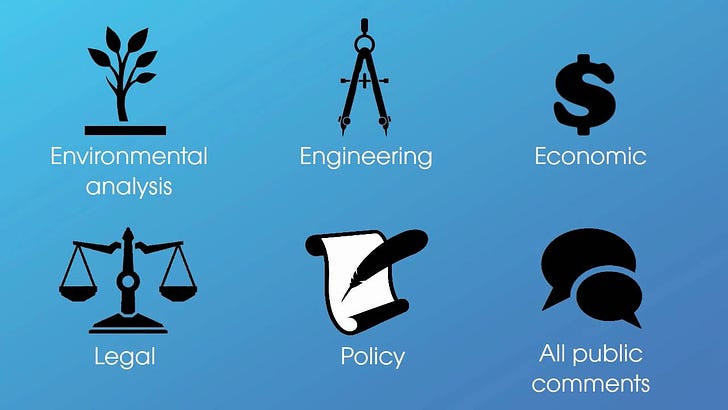


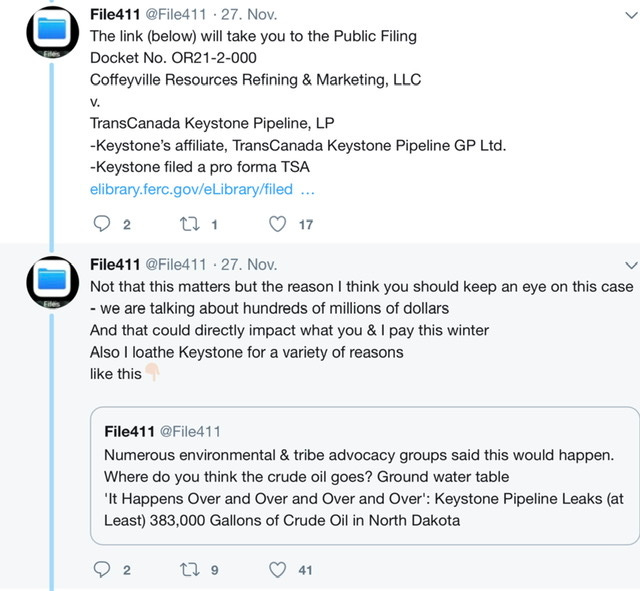

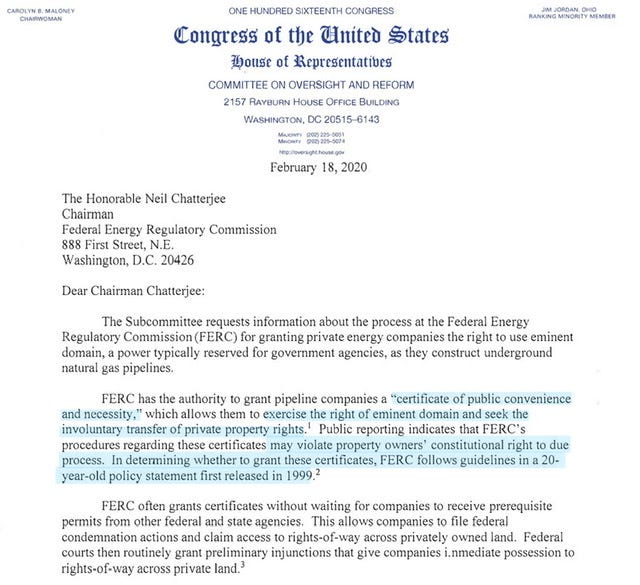
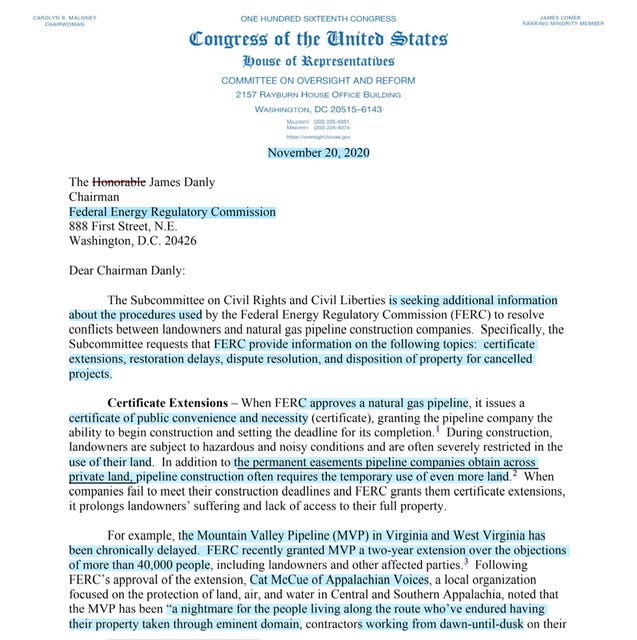
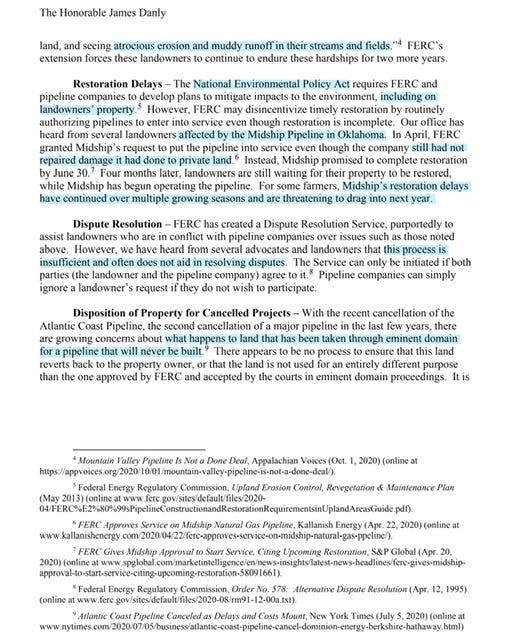



I live in Pennsylvania, and a few friends have been negatively impacted by construction of the pipeline. Land destroyed, groundwater contaminated, monies promised that never materialized because... oops... bankrupt! oh well, we got nothin, you get nothin... Greed, again...
This practice in addition to fracking is poisoning the underground water supply. The Earth may survive this, but people will not.